Bulgarian History up to the 12th century through the view of the ancient authors
- Автор: Николай Колев
- Издател: Гута-Н
The purpose I pursue with this book is to compare the information that has come down to us from old writers and to draw some conclusions about the people who spread the Bulgarian state to the Balkans, without resorting to the numerous contemporary books that I have read and that fill my library.
I do this not out of disrespect for the tremendous work of contemporary Bulgarian writers and historians, but out of a desire to make an independent assessment of events and to draw my own conclusions about the relationship and sequence of events and their consequences by reading only older authors.
I hope the book will find a place in the library of an educated and unbiased Bulgarian, to serve him as a reference book of information from old authors that have come down to us, about various events in the European history. It can also be a valuable reference for schoolchildren, students, researchers and teachers.
Description:
- History of Bulgaria;
- History of the Balkans;
- History of Eastern Europe;
- History of Europe;
- Antiquity;
- Thracians, Gauls, Celts, Cimbri, Getae, Goths, Huns, Utigurs, Kutrigurs, Slavs, Bulgars.
In numerous conversations with my children who grew up in Germany, questions like "Who are we, the Bulgarians, and who created the Bulgarian state?" always came up. My children are intelligent and over the years it became clear that what I had learned at school, although I was always an excellent student, was not enough to answer these seemingly easy questions. Between 1944 and 1990 there was a chronic shortage of truth in Bulgaria, not that it was lacking, but somehow it did not reach us. After 1990, we experienced an explosion of historical publications, many of which expressed a fascination with the freedom to publish, which was lacking before, rather than the ability to think analytically before publishing. Over time this too has changed, a new generation of historians is now working and publishing and many of them think history textbooks should be re-written, but this is not yet happening. So, I remain indebted to my children with the answers to the above two questions, and while I'm still breathing, I wish I could change that situation.
The object which I pursue in the present book is to collate the information which has come down to us from the old writers, and to draw some conclusions concerning the people who extended the Bulgarian state into the Balkans, without the benefit of the numerous modern books which I have read, and which fill my library. This I do not out of lack of respect for the immense work of modern Bulgarian literary men and historians, but out of a desire to make an independent assessment of events and independent conclusions about the interconnectedness and sequence of events and their consequences, reading only the old authors.
By old authors I mean contemporaries of the events or those who described them after them. Such, for example, are the authors who wrote in Greek in Byzantium and in Latin in the Western Roman Empire. Authors working 100-200 years or more after the events being described often use older authors. However, they also tell us what the relationship is between events and life in the old and more recent times. Contemporaries are better informed in detail, and later authors have a better view of the general context of events and their outcomes. This is a very important source of information to orient one among the many different events and the names of the peoples involved in them.
Dear reader, allow me in this place to mention that I do not write a history, it is written with the actions of our ancestors. My modest task is to collect and arrange what is known in such order that you can create your own idea of Bulgaria's past. I am aware of the risk of this endeavor and ask for leniency.
In writing this book, I sought to greatly avoid assumptions about events for which we do not have credible information. In writing this book, I sought to greatly avoid assumptions about events for which we do not have credible information.
The method used to write this book is this: first, after reading the sources quoted in Chapter 40, I made samples that relate to Bulgarian history. This required a revision of the individual chapters to put the events in the right context and interlinks with each other. This was the most interesting part of the work.
Chapter 37 provides brief information about Tsarigrad (Constantinople). They are necessary in order to better understand the numerous unsuccessful attempts of the Bulgarians to take over this city.
Chapter 38 presents information on the measurement unites used by the old authors and their translation into the measurement unites used today. An important part of this chapter is also the section on chronologies used by various authors. Very often events are dated with the given year of the reign of one Roman emperor or another. That is why a table of East Roman emperors is provided, making it easier to check the dates. In the dating based on astronomical phenomena, which is by the way the most accurate, I have used the tables of the American Astronautical Agency.
The quoted text of the old authors is always in quotation marks. I use brackets in such text to introduce my own clarifications, without indicating that these are the author's notes. Chapter 40 contains the literature cited. The citation of sources in a book is most often followed by two numbers, one denoting the volume number and the other the page number. When the volume is a single volume, only the page is indicated. The years after the birth of Christ are given only by a number only. The years before the birth of Christ are given by a number followed by BC.
The spelling of personal names varies across linguistic traditions. This should not disturb us. I will preserve the original record in the quotations in order not to alter their originality, but in my text I will use names related to the Bulgarian linguistic tradition.
The book ends with information about the uprising of Asen and Peter and the liberation of Bulgaria from Byzantine rule.
I hope the book will find a place in the library of the educated and open-minded Bulgarian, to serve him as a reference for information from the old authors who have reached us about various events in our history. It can also be a valuable reference material for pupils, students, researchers, and teachers.
Nikolay Ivanov Kolev (Gutev)
1.1.2015
Herzogenaurah
Germany
Table of Contents
1. Foreword
A word of praise for Gancho Tsenov
Works of Gancho Tsenov (1870-1949)
2. A little geophysics and genetics
3. A Brief Guide to the Events Leading to the Expansion of the Bulgarian State in the Balkans
4. The peoples who expanded Bulgaria into the Balkans were the Huns
4.1 Kubrat 604-664
4.2 Great Bulgaria. The Bulgarians are the Unogundurs and Kotragi, who are a Hunnic people
4.3 From Thrace to Hindu Kush and back to the Caucasus and Thrace
4.4 The Cimmerian brothers Utigur and Kutrigur
4.5 Bulgarians are descendants of Achilles' Myrmidons
4.6 The Bulgarians are the descendants of the Peonians, who are the descendants of Achilles'
Myrmidons
4.6.1 From Galata to Crimea, the Bosphorus Empire
4.6.2 From Galata to Central and Western Europe
4.7 Achilles' father - ruler of myrmidons and dolopes, the Dulo clan
4.8 Romans conquer Peonia in Epirus, migration of survivors along the Middle Danube, Pannonia is
"relocated" Peonia
4.9 Masageti or Besigeti - Huns - Bulgarians
4.10 Sarmatians - Huns - Bulgarians
4.11 The relationship between ancient Scythians, Getae, Huns and Bulgarians
4.12 The relationship between the ancient Scythians and the Parthians - today's Persians
4.13 The relationship between ancient Scythians with Bactria and Sogdiana
4.14 Hunnu
4.15 Khazars and Bulgarians, Khazar state
4.15.1 4th century BC to the 7th century, the language of the Khazars
4.15.2 Fall of Sogdiana in 565. Resettlement of Euthalites in Khazaria and Bulgaria
4.15.3 Relocation of Great Bulgaria to the West and South under the pressure of Khazaria
4.15.4 Geographical location of Khazaria
4.15.5 State structure of Khazaria
4.15.6 Judaism in Khazaria
4.15.7 Khazaria, Bulgaria and Byzantium
4.15.8 End of the Khazar state
5. The Getae or Goths before the reign of Attila
5.1 Thracians Getae Dacians, Goths: Besi-Goths, Ostro-Goths, Vandals, Gepids Slavs
5.2 How did the Getae become Goths and the Goths Slavs?
5.3 The Getae are not Germans, therefore the Goths are not Germans
5.4 Legends about the origin of the Huns from the Getae
5.5 Before the Trojan War in 1183 BC
5.6 Trojan War, a war between Thracians and Greeks in coalition with other Thracians in 1183 BC
5.7 The defeat of the Cyrus Persians at in 530 BC
5.8 Darius' campaign against the Getae in 513-512 BC
5.9 Xerxes' failed attempt to finish the work of Darius in 480 BC
5.10 Perdiccas II, Philip the Great, Alexander the Great and the Getae in 432-323 BC
5.11 The successor of Alexander the Great and the Getae
5.12 Burevista and the Romans
5.13 The poet Ovid's account of the population of the Black Sea in the vicinity of the Danube around
the Nativity of Christ
5.14 Trajan, Gallienus, Aurelian and the Getae
5.15 About the culture of the old Geth
5.16 Return of the Ostrogoths to the Balkans
5.16.1 Summary of the Gothic invasions of the Balkans from 238 to 337
5.16.2 Old authors on the Gothic invasions of the Balkans from 238 to 337
5.16.3 Constantine the Great and the Goths, the religion of the Goths became the state religion
5.17 Neighbours of the Goths
5.18 Civil war in the Gothic state
5.19 The Huns conquer the Ostrogoths
5.20 Visigoths settle in Mysia and become Christians
5.21 The Wesegoths revolt. Death of Emperor Valens on 9 August 378
5.22 Theodosius' war with the Visigoths and the treaty with them
6. Huns-Bulgarians, the Empire of Attila
6.1 Who is Attila?
6.2 Joint reign of Bleda and Attila
6.3 Attila, wars
6.4 Envoys, capital of Attila, conspiracy against him
6.5 Battle of the Catalaunian Plains, 451
6.6 The Death of Attila
6.7 The heritage of Attila
6.7.1 The Battle of the Nations in Pannonia at the River Neda
6.7.2 The Gepids settle in Dacia
6.7.3 Huns, Alans and other peoples settle this side of the Danube
6.7.4 Minor Goths inhabit the Nikopol area
6.7.5 And which peoples remained or settled in Pannonia?
6.8 Relations between the Huns and Persia
6.8.1 The wars of 305-313
6.8.2 The wars in 395
6.8.3 The wars of Hedigerd II in 438-457
6.8.4 The wars of Peroz with the Huns in 459-484
6.8.5 Christianity in Persian Lasika in 526, a new Hunnic intervention in Asia
6.8.6 Боа, персийска принцеса и царица на хуните
6.8.7 Whether Irnik and Wallach are not the same person?
7. Ostrogoths and Bulgarians after the death of Attila
7.1 The Ostrogoths ravage Illyricum. Theodoric - hostage in Constantinople
7.2 Ostrogoths war again with Huns, death of Valamir
7.3 Ostrogoths at war with Germanic peoples, the return of Theodoric from Constantinople
7.4 The First Battle of Theodoric the Great in 472
7.5 The Ostrogoths settled within Illyricum, Macedonia and Thessaly
7.6 Theodorich Tiudimirov in Mysia
7.7 Goths in their quest for power in Constantinople
7.8 Who is Mundo?
7.9 The Goths take over Sirmium
7.10 War against Sabinian in 505, Mundo in alliance with Theodoric the Great
7.11 Ode to the Bravery of Goths and Bulgarians
7.12 Theodoric reigned in Italy and Spain
7.13 After the death of Theodoric the Great Mundo switched to the side of Byzantium in 529
7.14 Suppression of the Nika rebellion in 532
8. Early Christianity in the Balkans; Bulgarian alphabet; Religious wars
8.1 Paul the Apostle
8.2 The Greeks and early Christianity
8.3 Spread of Christianity in the Balkans
8.4 Christianity under the Huns?
8.5 Constantine the Great and the Council of Nicaea
8.6 The Council of Sofia, splitting the churches
8.7 Julian the Apostate
8.8 The Alphabet of the Getae, the Genius of Urfil
8.9 Christianity on the northern coast of the Black Sea
8.10 The struggle of the Greeks against the Arians
8.11 The Religious Civil War, Vitalian
8.11.1 Comes Marcellinus on the rebellion of Vitalian
8.11.2 Theophanes the Confessor on the rebellion of Vitalian
8.11.3 John Malala on the rebellion of Vitalian
8.11.4 John of Antioch on the rebellion of Vitalian
8.11.5 Georgi Kedrin and Ioan Skilitsa on the rebellion of Vitalian
8.12 Attempt to convert the Bosporan Bulgarians
8.13 Archdiocese First Justiniana
9. Justinian's policy towards Kutriguri and Utiguri and the Pannonian Hun-Avars
9.1 Goths ask Justinian for a bishop in 548, envoys
9.2 Civil war in Great Bulgaria between Kutriguri and Utiguri
9.3 The march of the Kutrigurian ruler Zabergan through Thrace to Constantinople in 548
9.4 The Kutrigurs fought at Chersonesos and in Hellas
9.5 Slav allies of Zabergan. Their attacks in 548, 549 and 550
9.6 Again a quarrel between Kutriguri and Utiguri provoked by Justinian
9.7 Pannonian Hun-Avars, conquerors of Gepids, Kutrigurs and Utigurs
10. Avars and Bulgarians: avaro-bulgarian alliance
10.1 Ogori, Hun, Wari, Avari, Bayowari
10.2 The barbarians defeated the Severians in 464 and drove them from their lands
10.3 Bulgarians are at latest from the 4th century in the Balkans
10.4 The Avars were a Hunnic and Bulgarian people by descent. Settlement in Mysia
10.5 Avars subjugate Utigurs and Kutrigurs
10.6 Settlement of Bulgarians and Avars in Pannonia
10.7 Other peoples from Hun and Var joined the Avars in Pannonia
10.8 The First Avar War against Byzantium in 539-545
10.8.1. Chalcidian War in 539
10.8.2 Constantinople War in 542-543
10.8.3 Peloponnesian War in 545
10.9 Slavic attack on Niš 550
10.10 The Second Avar War against Byzantium in 558-559
10.11 Sensation for the Byzantine public - Avar delegation in Constantinople
10.12 Avars and Slavs
10.13 Settlement of the Peloponnese with Slavs in 581-585. The Avar war against the Slavs of the
Transdanubia in 578-582
10.14 Avars take over Sirmium
10.14.1 Preparing for war in 578
10.14.2 Bayan buys time with negotiations to complete Sava bridge
10.14.3 Emperor's failed attempt to make peace with Bayan
10.14.4 The Empire lost Sirmium in 582
10.15 Permanent settlement of Slavs in the Peloponnese in 582
10.16 First attack on Thessaloniki by Slavs led by Hatsun in 582
10.17 Conquest of Augusta, a fortress at the mouth of the Ogosta River, west of Oryahovo and
Viminacium, in 582
10.18 Conquest of Singidunum in 583
10.19 Conquest of Anchialos in 584
10.20 Invasion of the Slavs to the Long Wall in 581-584
10.21 Second attack on Thessaloniki by Avars, Bulgarians and Slavs in 584
10.22 Third attack on Thessaloniki in 586 - reconnaissance campaign
10.23 Conquest of Bononia (Vidin) in 587
10.24 The return of the Avars to present-day Northern Bulgaria in 587
10.25 Re-invasion of the Avars in Thrace and their defeat in 587
10.26 Near Adrianople to Constantinople in 592
10.27 Priscus' campaign against the Slavs across the Danube in 593
10.28 Bulgarians near Nove, today Svishtov, defeat in 597 Roman legion
10.29 The commander Priscus replaces Peter and marches across the Danube in 597
10.30 Conquest of Dalmatia in 599 by the Avars, arrival of the Croats in Dalmatia
10.31 Turks around the Alps? What are these Turks, and do they have anything at all in common
with the Altaic Turks?
10.32 Avar and Roman troops at Tomi in 600
10.33 Mauricius orders Comentiolus to hand over the rebellious Roman army to the Avars. Awars
again in Thrace in 600
10.34 The defeat of the Avars at Viminacium in 601
10.35 War of the Avars and Romans against the Slavs in 602
10.36 Fourth attack on Thessaloniki in 602 by the awars
10.37 The treacherous deed of the Avar Khagan in 619
10.38 Peace with the Avars and campaign against Persia in 621-622
10.39 Western Slavs take advantage of the Avars' campaign against Constantinople in 623
10.40 March of Avars, Bulgarians and Slavs against Constantinople in 626
10.40.1 Description of Patriarch Nikephoros
10.40.2 Description according to "The Paschal Chronicle"
10.40.3 Description of Theophanes the Confessor
10.41 Bulgarians fought their independence from the Avars
10.41.1 Unsuccessful attempt of the Bulgarians to take the Avar throne in 632
10.41.2 The successful uprising of Kubrat in 634
10.41.3 Settlement of Bulgarians in Italy in 663
10.42 Fifth attack on Thessaloniki by Slavs in 645-647
10.43 The uprising of Kuber against the Avars and the expansion of Bulgaria to the Bitola field
after 679. Sixth attack on Thessaloniki
10.44 Avars and Bulgarians in Pannonia and their western neighbours
10.44.1 Langobards and Bulgarians
10.44.2 Franks and Avars
10.45 The war of the Arabs against Constantinople in 673-680
10.46 Peace between Avars and Byzantines in 680
10.47 The Franks fought a devastating war with the Avars under Charlemagne in 791-799
10.48 Fortification of the Avar capital
10.49 Bulgarians completely destroyed the Avars under Krum in 803-814
11. Communications of the old authors about the Bulgarians in the Balkans
11.1 Introduction
11.2 The oldest records of Bulgarians in Europe
11.2.1 The Trojan War
11.2.2 The Macedonians, the greatest propagators of Hellenic culture, are not Greeks but
Thracians, descendants of the Pelasgians
11.2.3 Formation of Getae and Hun ethnic groups around the time of Alexander
11.2.4 Philip and Alexander of Macedonia, Thrako-Illyrians rejected to the Ocean
11.2.5 The Gauls return from the Ocean to the Balkans and Asia Minor
11.2.6 The Legends of the Origin of the Bulgarians, recorded by Spyridon of Gabrovo
11.2.7 Gods of the Bulgarians before Christianity recorded by Dobri Voynikov
11.3 The oldest records of the Bulgarians in Asia
11.4 The first century
11.5 The second century
11.6 The Third Century
11.7 The fourth century
11.8 The fifth century
11.8.1 Bulgarians living in Thrace and threatened Constantinople in 447
11.8.2 Bulgarian army recruited against the Goths in 488
11.8.3 Bulgaria controlled the area from the Tisza River to Kiev after 491
11.8.4 War of Byzantium for the liberation of Thrace from the Bulgarians. Major victory of the
Bulgarian army near the Cherna River in 495-499
11.8.5 Bulgarians settle in Italy
11.9 The Sixth Century
11.9.1 Massive Bulgarian invasion of the Balkans in 501-503
11.9.2 Bulgarians and Goths jointly fought under Vitalian against Byzantium in 513-518
11.9.3 12 000 Bulgarian cavalry came from Great Bulgaria to Pannonia in 526
11.9.4 Battles between Bulgarians and Byzantines at the Yantra River in 535
11.9.5 Mundo captured the city of Salona in 536 for Byzantium
11.9.6 War of Avaria and Bulgaria against Byzantium in 539
11.9.7 Mundo passes into the service of Byzantium as governor of Illyricum. Resistance of the
Bulgarian population in 540
11.9.8 Boris inflicts a final defeat on Justinian and forces him to pay tribute in 540
11.9.9 The death of Mundo, after 540
11.9.10 Byzantium attacked the Gothic state in Italy with Bulgarian soldiers in 548
11.9.11 Bulgarians and Lombards in 550-568
11.9.12 Large-scale military actions of Bulgarians against Constantinople before 582
11.9.13 The Avars came to Europe from Great Bulgaria and were a Hunnic and Bulgarian people
11.9.14 Participation of the Bulgarians in the Avar-Bulgarian war against Byzantium between 597
and 601
11.10 Seventh century, the last joint attack on Constantinople by Avars, Bulgars, Gepids, Slavs and
Persians in 625
12. Expansion of Bulgaria in Lower Mysia in 680
12.1 The Narrative of Patriarch Nikephoros
12.2 The Narrative of Theophanes the Confessor
12.3 The Narrative of Anastasius the Librarian
12.4 Information from the Annals of Manasiy
12.5 Information of Simeon Logothete
12.6 Information of Leo Deacon
13. Kuber
14. Asparuh 633-694
14.1 Asparuh and Kuber defending what they conquered against Justinian II in Illyria and Thrace
in 688
14.1.1 The Narrative of Siegebert
14.1.2 The narrative of Georgi Kedrin and Ioan Skilitsa
14.1.3 The Narrative of Anastasius the Librarian
14.1.4 The Narrative of Patriarch Nikephoros
14.1.5 The Narrative of Theophanes the Confessor
14.1.6 The Narrative of Paisii Hilendarski
14.2 Mauricea. Bulgarians fought on Muhammad's side in 693
14.2.1 The Narrative of Patriarch Nikephoros
14.2.2 The Narrative of Anastasius the Librarian
14.2.3 The Narrative of Leo the Grammarian
14.2.4 The Narrative of Theophanes the Confessor
14.3 Paisiy Hilendarski's account of the death of Asparuh in 694
15. Tervel 694-715
15.1 Tervel returned Justinian to the throne in 705
15.1.1 The Narrative of Paul Deacon
15.1.2 The Narrative of Patriarch Nikephoros
15.1.3 The Narrative of Theophanes the Confessor
15.1.4 The Narrative of Anastasius the Librarian
15.1.5 References of other authors
15.2 Justinian Rinomet breaks peace with the Bulgarians, Bulgarian victory at Anchialos in 708
15.3 Tervel in vain sent military aid to Justinian II in 711
15.4 Tervel at the Golden Gate in 712
15.5 Arabs besieged Constantinople in 715
15.5.1 Attempted coup of deposed emperor Artemius who asks Tervel for help 715. Thessaloniki
is under Bulgarian rule
15.5.2 Byzantium's request for help against the Arabs 715
15.5.3 Peace treaty between Bulgaria and Byzantium signed between 715 and 717
15.5.4 A scary winter in 717
15.6 The Bulgarians defeated the Muslim Arabs who besieged Constantinople in 715-718
16. Kormisosh 712-760, Vineh 753-760
17. Unknown ruler 714-742 of the Dulo clan
18. Sevar 744-759
18.1 Bulgarians at the Long Wall. First campaign of Constantine V Compronimus against Bulgaria
in 754-756
18.2 Second campaign of Constantine V Copronymus against the Slavinians in Macedonia
in 758-759
18.3 Third unsuccessful campaign of Constantine V Copronymus in Bulgaria in 759-760
19. Telts 760-763 and his ill-fated war with Byzantium in 763
19.1 Black Sea freezes from extraordinary cold 762/763
19.2 Civil war in Bulgaria. Slavs left the Bulgarian lands en masse. Fourth campaign of
Constantine V against Bulgaria. Defeat of the Bulgarian army at Anchialos on 30 June 763
19.2.1 The Narrative of Patriarch Nikephoros
19.2.2 The Narrative of Anastasius the Librarian
19.2.3 The Narrative of Theophanes the Confessor
20. Sabin 762-763 and his flight to Byzantium
20.1 The Narrative of Anastasius the Librarian
20.2 The Narrative of Theophanes the Confessor
20.3 The Narrative of Patriarch Nikephoros
21. Pagan (Boyan) 764-765
21.1 Policy of Byzantium towards the Slavs
21.2 Constantine V's fifth and sixth campaigns against Bulgaria in 764 and 765
21.2.1 The Narrative of Anastasius the Librarian
21.2.2 The Narrative of Patriarch Nikephoros
21.2.3 The Narrative of Theophanes the Confessor
21.3 Great drought in 767
22. Tellerig 770-778
22.1 Constantine V's seventh campaign by land and sea against Bulgaria in January 774. Terrible
defeat of the Byzantine army at Aheloy
22.2 Unsuccessful attempt by Tellerig to bring the Berzites to Northern Bulgaria in October 774
22.3 Eighth naval campaign of Constantine V against Bulgaria in 775
22.4 Ninth naval campaign of Constantine V against Bulgaria in 775-776
22.5 Tellerig abdicated the throne and moved to Constantinople in 777
23. Kardam 778-807
23.1 Slavs in Greece became taxpayers of Byzantium in 783
23.2 Byzantium restored its authority over Zagora in 784
23.3 The Byzantines suffered defeat by the Bulgarians at the Struma River in 789
23.4 The Byzantines suffered defeat by the Bulgarians at Provat in 791
23.5 The Byzantines suffered defeat by the Bulgarians at Markeli in 792
23.6 Constantine VI refused to pay tribute to the Bulgarians in 796
23.7 Akamir, the prince of the Slavs, prepares a plot against Empress Irene
23.8 Franks and Avars at the time of Charlemagne and Kardam
24. Krum 807-814
24.1 Destruction of the Avar state. Krum's Laws
24.2 Nikephoros set out against the Bulgarians in 807
24.3 Charlemagne ultimately defeats the Avars
24.4 Krum's successful march to the Struma valley in 809
24.5 Krum conquered Serdica in 809. Nikephoros displaces Romans in Slavic areas
24.6 Byzantium made peace with the Franks in 811. War between Franconia and Bulgaria
24.7 The atrocities of Nicephorus and the victory of Krum in 811
24.7.1 The Narrative of Theophanes the Confessor
24.7.2 Anonymous Vatican Narrative
24.7.3 The Continuator of Theophanes
24.8 The Fate of Stavrakius
24.9 Michael I Rangave's refusal to accept Krum's second peace proposal in 811. Krum captures
Mesembria
24.10 Krum conquered Debelt in 812. The Romans leave the Thracian fortresses
24.11 Krum inscriptions
24.12 The Bulgarians conquer Adrianople on 22 June 813
24.13 The Byzantines want help from the Franks against the Bulgarians
24.14 Krum besieges Constantinople on 19 July 813
24.15 Assassination attempt on Krum during peace negotiations in late July 813
24.16 Krum devastates Thrace
24.17 The conquest of Adrianople in August 813
24.18 New attack and kidnapping of captives in the warm winter of 813/814
24.19 Crum prepares a final showdown with Constantinople in March 814. Death of Krum on
11 April 814
24.20 The famous captive from the conquered Adrianople
25. Omurtag 822-831
25.1 On the Structure of the State
25.2 Omurtag's only war with Byzantium, peace treaties between Omurtag and Leo V
25.2.1 The war in 814 according to Joseph Genesius
25.2.2 The War of 814 according to Skilitsa and Kedrin
25.2.3 The war in 814 according to the Continuator of Theophanes
25.2.4 Comment
25.2.5 Oath-taking ceremonies at the conclusion of the 30-year peace treaty in 814
25.2.6 Text of the 30-year peace treaty. The southern border of Bulgaria in 814
25.2.7 Confirmation of the annual peace treaty in 820
25.2.8 The Peace of Omurtagh
25.3 Omurtag helped Michael to suppress the rebellion of Thomas the Slav in 820-823
25.4 War on the Dnieper
25.5 Slavic peoples renounce the alliance with the Bulgarians and side with the Franks in 819
25.6 Omurtag sent envoys to Emperor Ludwig
25.7 The Bulgarians appointed their governors in Pannonia in 827
25.8 The Bulgarians ravaged Upper Pannonia in 828
26. Malamir 831-836
27. Presian 836-852
27.1 War with the Smolyans
27.2 Attitudes towards the Western Slavs
27.3 Return of citizens of Adrianople captured by Krum to Macedonia in 836
27.4 Bulgarian-Serbian relations, Presian lost a war with young Serbia in 840
28. Boris or John-Michael 852-888, 893
28.1 Peace with Byzantium
28.2 Attempt of the Kievan Russians to help the opponents of Christianity
28.3 The war with the Croats in 874
28.4 Relations with the peoples of Central Europe
28.5 Relations with Serbia under Tsar Boris
28.6 Conversion of the unbaptized Bulgarians
28.6.1 The conversion according to "The Miracle of St. George and the Bulgarian"
28.6.2 Conversion according to John the Baptist
28.6.3 The Conversion according to the Continuator of Theophanes
28.6.4 The Conversion according to the "Chronicle of Leo the Grammarian"
28.6.5 The Conversion according to Nestor
28.6.6 The Conversion according to the Annals of Manassiy
28.7 Foreign Bishops in Danube Bulgaria
28.7.1 Roman Bishops in Bulgaria
28.7.2 The German Bishops in Bulgaria
28.7.3 Greek Bishops in Bulgaria
28.7.4 Nevertheless, why did Boris make Christianity the state religion?
28.8 Beginning of the Magyar invasion of Europe
28.9 Relations with the Germans
28.10 Relations with the Pannonian Slavs, Arnulf allied with the Bulgars against Svetopolk in 883
28.11 Where did the Magyars come from before they conquered their present lands?
28.12 Magyars and Germans liquidate Svetopolk's state in Moravia
29. Cyril and Methodius
29.1 The Alphabet
29.2 Cyril
29.2.1 Education
29.2.2 Proposal for a senior government post
29.2.3 Lecturer in Constantinople
29.2.4. The dispute with the iconoclasts
29.2.5 Mission to Baghdad in 851
29.2.6 Methodius governor of the Slavic province 836-851
29.2.7 The Khazar Mission 852
29.2.8 Working on the Slavonic writing with Methodius in Olympus, Asia Minor 853-863
29.2.9 The Moravian Mission 864-867
29.2.10 The dispute in Venice in 868
29.2.11 Rome 868-869
29.2.12 The Deeds of The Brothers in the Czechia
29.3 Methodius
29.4 Which books were translated by Constantine and Methodius?
29.5 The language of translations
30. Simeon 891-927
30.1 Youth
30.2 Structure of the Bulgarian State under Simeon
30.3 Moving the market from Constantinople to Thessaloniki and the war between Bulgarians and
Romans in 894-896
30.3.1 The War according to the Continuator of Theophanes
30.3.2 War according to Herman of Augia
30.3.3 The War according to the Fulda Chronicles
30.3.4 War according to the Continuator of George Monk
30.3.5 The war according to Constantine Porphyrogenites
30.3.6 The war according to Bulgarian sources
30.4 The conquest of the Bulgarian vassal principalities on the Tisza and the Transylvania by the
Hungarians
30.5 The tactics of the Hungarians in their war against Bulgaria
30.6 Thessaloniki captured by Arabs during Bulgarian raids in 904, Bulgarian borders reach
Thessaloniki and the Adriatic
30.7 Oleg besieges Constantinople with 2000 ships and cavalry in 907
30.8 Unsuccessful negotiations for the return of the Byzantine captives in 908
30.9 Simeon's campaign against Constantinople in 913
30.10 New war with Byzantium in 914-915
30.10.1 Byzantium negotiates with the Pechenegs for war against the Bulgars in 914
30.10.2 The first conquest of Adrianople by Tsar Simeon in 915
30.10.3 The Bulgarian army at the Corinth Strait in 915
30.10.4 The Bulgarian army conquered the Thessaloniki and Dracca region in 915
30.11 Defeat of the Byzantine army at Anchialos on 6.VIII.917
30.12 Defeat of the Byzantine army at Catassirti in late August, early September 917
30.13 Serbia - Province of Bulgaria
30.14 The march of the Bulgarians to the suburbs of Constantinople in 921-922
30.15 Second conquest of Adrianople by Tsar Simeon 921-922
30.16 Simeon in the city of Viza 922-925
30.17 Tsar Simeon's meeting with Emperor Romanus Lakapin in 924
30.18 Croatia independent of Bulgaria
30.19 Bulgarians on the Volga River converted to Islam in 922
30.20 The death of Simeon in May 927
30.21 Simeon and his brother Michael - founders of the national education system of Bulgaria
31. Tsar Peter, 926 - 30 January 969
31.1 Peace with Byzantium, the wedding of the century between Peter and Mary on 8.X.827
31.2 The legendary Bojan
31.3 The rebellion of Ivan, the brother of King Peter, in 928
31.4 Formation of the Serbian state in 928
31.5 The rebellion of Michael, brother of King Peter, in 930. The Splitting of Bulgaria
31.6 Bulgarian queen Maria goes to Constantinople with her children in August 931
31.7 Raids of the Magyars in Roman land in 934 and 943
31.8 Constantine VII Porphyrogenites sends a message to the Bulgarians in 945
31.9 New attack of the Magyars in 962
31.10 Peace between Bulgarians and Franks
31.11 Peter's Church Policy and the Growing Byzantine Influence in Bulgaria
32. The war of the Kievan Russians with Bulgaria. Occupation of Eastern Bulgaria by the Russians
32.1 Kievan Rus repeatedly attacked Constantinople and destroyed Khazaria
32.2 Kievan Rus conquered northeastern Bulgaria in 968
32.3 New peace treaty between Byzantium and Bulgaria
32.4 War of Byzantines and Bulgarians against Russians and Bulgarians in Southern Bulgaria
32.5 The war of Byzantium against the Kievan Rus in Northeastern Bulgaria, conquest of Preslav
32.6 Volga Bulgaria successfully repels Kievan Rus'
32.7. The wars of Russians and Bulgarians on the Volga
32.8. The Mongols conquered Volga Bulgaria in 1223
32.9. The Rus conquered Volga Bulgaria in 1590
33. The war of Byzantium with Western Bulgaria, Samuel
33.1 Civil war in Byzantium from 976 to 988
33.2 Samuel comes to power
33.3 Victory of Samuel at Ihtiman Pass on 17.8.986
33.4 Samuel captures Verea, west of Thessaloniki
33.5 Samuel led successful battles to Thessaloniki in 996
33.6 Larissa in the hands of Samuel
33.7 Samuel loses the Battle of the River Alamana
33.8 The wedding of Samuel's daughter to the captured Ashot, Drach is taken by treachery
33.9 Plovdiv again in the hands of Byzantium in 1001
33.10 Preslav and Pliska again in the hands of Byzantium in 999
33.11 Ber and Servia again in the hands of Byzantium in 1000
33.12 Voden again into the hands of Byzantium
33.13 Vidin in the hands of Byzantium 1002, Samuel plunders the fair in Adrianople
33.14 Defeat at Vardar, Skopje falls
33.15 Unsuccessful siege of Pernik in 1004
33.16 Samuel's defeat at Belasitsa on 29 July 1014
33.17 Fall of Melnik, Pelagonia, Prilep and Shtip
33.18 New uprising in Voden and its suppression in 1015
33.19 Conquest of Mughlen and Enotia
33.20 Samuel's son - Gavril Radomir - became tsar on 15.IX.915
33.21 Death of the last Bulgarian king Ivan Vladislav, capture of Ohrid
33.22 Taking of Strumica and Boyana, the siege of Pernik
33.23 Again Russians fought on the side of Byzantium against Bulgaria in 1017
33.24 Administrative Structure of Conquered Bulgaria
33.24.1 First Charter of Basil II of 1019
33.24.2 Second charter of Basil II of 1020
33.24.3 Third charter of Basil II of 1020
33.25 Decree of Basil II against the Bulgarians
34. Uprisings against Byzantium
34.1 Peter Delyan 1040
34.2 Georgi Manyac
34.3 The Pechenegs in Bulgaria
34.4 Uzi in Bulgaria
34.5 The Revolt of Georgi Vojtech 1071
35. The rebellion of Asen and Peter in 1187. Liberation of Bulgaria
35.1 Account of Georgi Acropolit
35.2 Account of Theodore Scutariot
35.3 Information of Nikita Honyat
35.4 Restoration of Bulgarian culture
35.5 Ivanko, the murderer of Assen
36. Chronology
36.1 Before Christmas
36.2 First century
36.3 Second century
36.4 Third century
36.5 Fourth century
36.6 Fifth century
36.7 The Sixth Century
36.8 The Seventh Century
36.9 The eighth century
36.10 The ninth century
36.11 The tenth century
36.12 The eleventh century
36.12 The twelfth century
37. Constantinople
37.1 Pontus, Propontus, Cimmerian Bosporus, Thracian Bosporus, Bosporus
37.2 The Cherson Bosphorus
37.3 Constantinople
37.3.1 The Thracian marketplace Byzopol or Byzantium
37.3.2 Byzantium becomes a Roman city
37.3.3 Byzantium became the capital of Constantine the Great in 324
37.3.4 The Old Wall of Byzantium
37.3.5 The Wall of Tiberius 14-37
37.3.6 The Wall of Theodosius 413
37.3.7 Anastasius, the Long or Thracian wall 512
37.3.8 The Iron Chain through the Golden Horn
37.3.9 Million
37.4 The foundation of Heraclea
37.5 The Founding of Adrianople
37.6 The foundation of Thessaloniki
37.7 The surroundings of Constantinople
38. Old measurement units
38.1 Time
38.2 Roman and Byzantine Emperors
38.3 Weight
38.4 Monetary units
38.5 Length
39. References
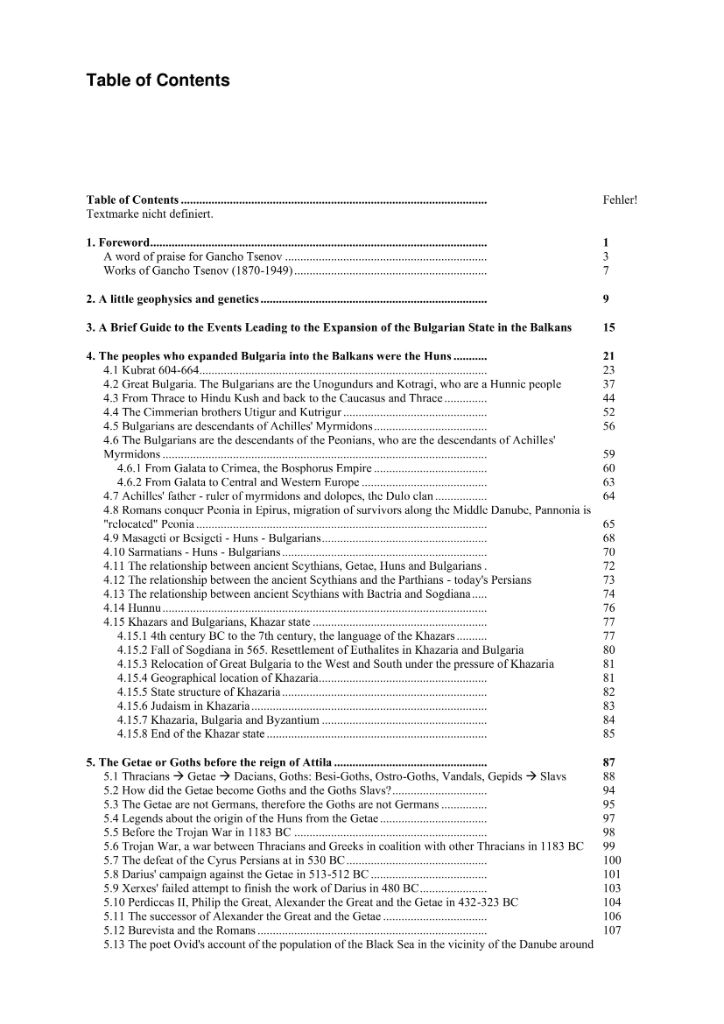
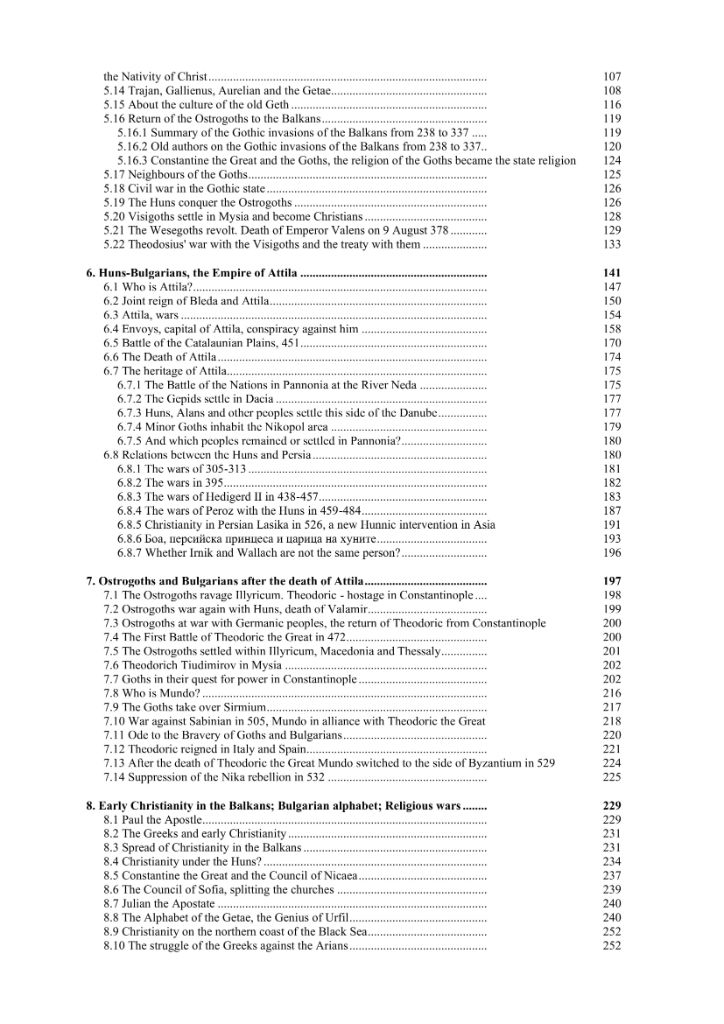

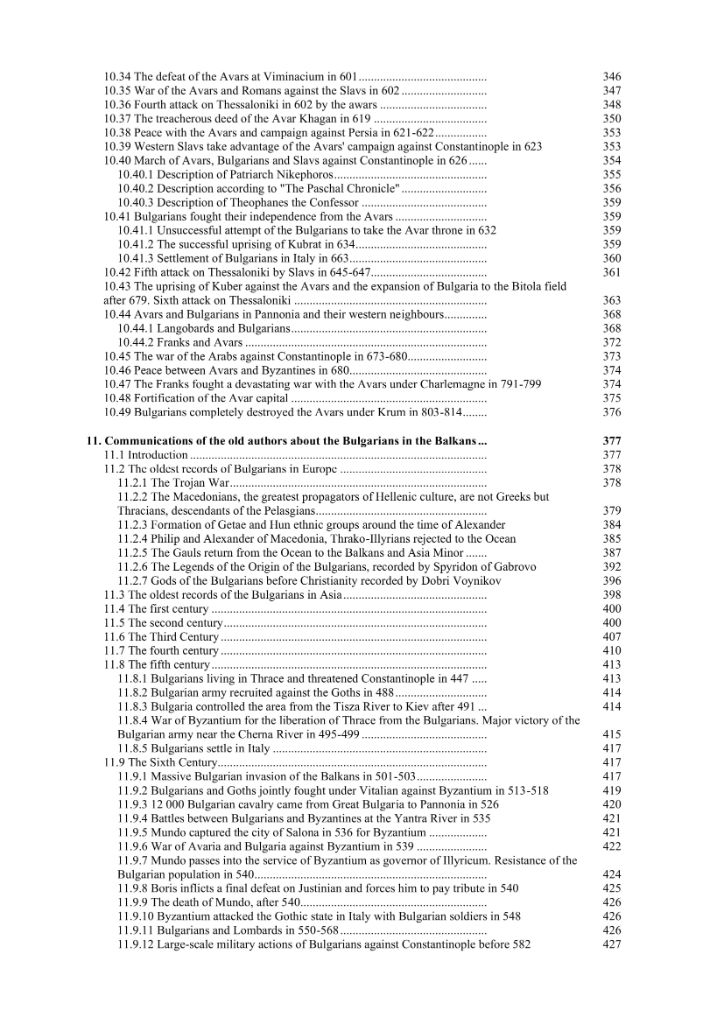

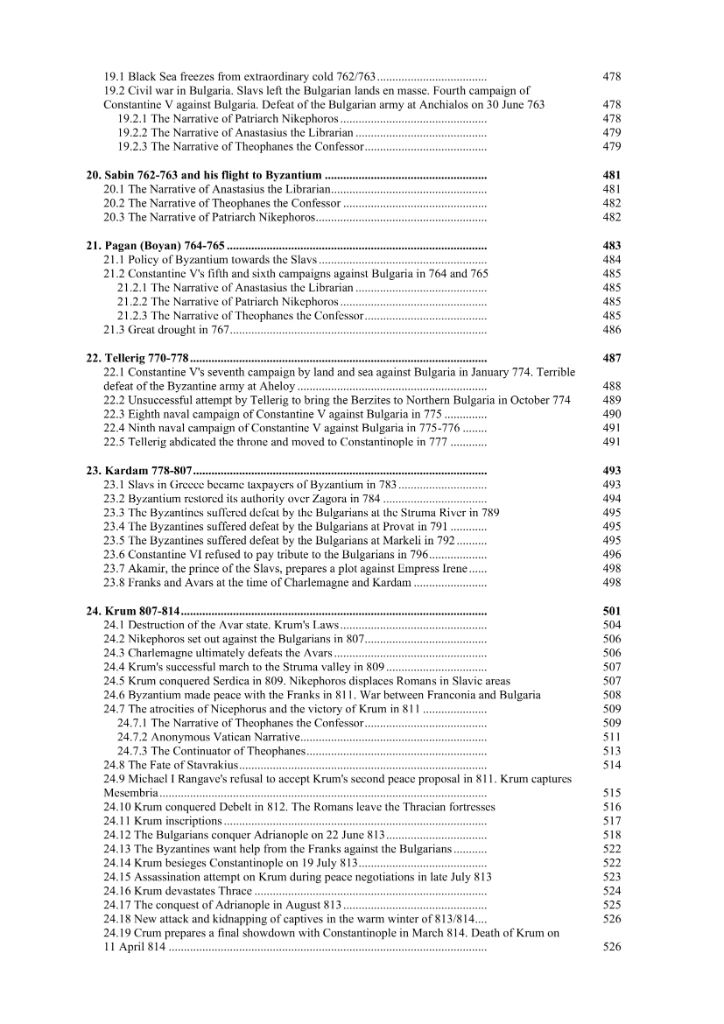

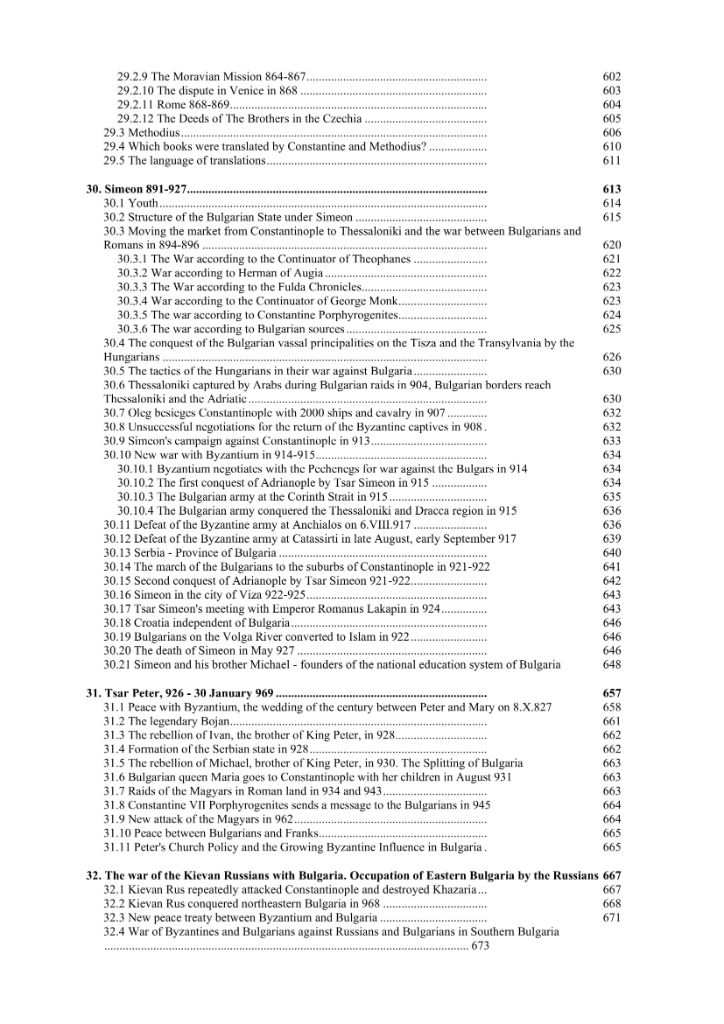

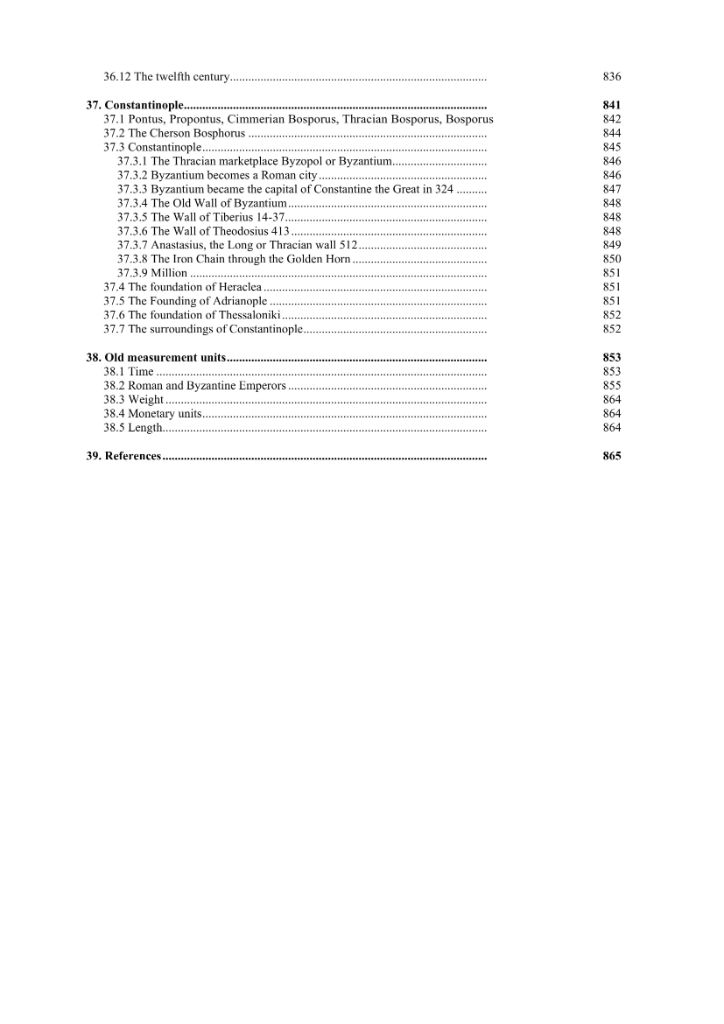
Поръчките от Онлайн книжарница Ciela.com се доставят от Спиди, Еконт и BoxNow за България, и от Български пощи за чужбина.
- За поръчки под 30 €, стойността на доставката е фиксирана на 3,06 €
- За поръчки с BOX NOW доставката е 1,72 €
- За поръчки на обща стойност над 30 € доставката е безплатна.
- За чужбина доставката се изчислява според тарифите на Български пощи, и зависи от избраната държавата, броя, големината и теглото на поръчаните продукти. Крайната стойност се визуализира, преди завършване на поръчката.
- За поръчка на правен софутер няма доставка. Получавате потребителско име и парола по предоставен имейл след потвърдено заплащане.
| Автор | Nikolay Ivanov Kolev |
|---|---|
| Издателство | Гута-Н |
| ISBN | 9783000481017-3 |
| Година на издаване | 2022 |
| Корица | Hardcover, imitation black leather, gold and silver embossing |
| Страници | 894 |
| Формат | 21x29,7 |
| Език | English |

